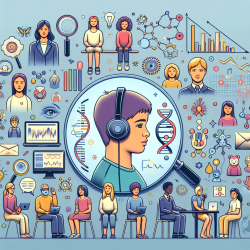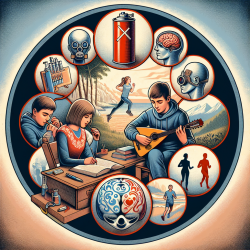Unlocking Children's Potential with the ECLiPS Questionnaire
In the ever-evolving landscape of special education, practitioners are constantly seeking effective tools to enhance the learning experiences of children with listening difficulties. The recent study titled A Multi-Sample Comparison and Rasch Analysis of the Evaluation of Children’s Listening and Processing Skills Questionnaire sheds light on a groundbreaking tool that can significantly impact children's auditory and cognitive development.
Understanding the ECLiPS Questionnaire
The Evaluation of Children’s Listening and Processing Skills (ECLiPS) questionnaire is a caregiver-report tool designed to assess the listening and processing skills of children aged 6 to 11. Developed to address the gap in qualitative measures for children with listening difficulties, ECLiPS evaluates five key areas:
- Speech and Auditory Processing (SAP)
- Memory and Attention (MA)
- Language, Literacy, and Laterality (LLL)
- Pragmatic and Social Skills (PSS)
- Environmental and Auditory Sensitivity (EAS)
These areas are crucial for a holistic understanding of a child's auditory processing capabilities and provide a comprehensive profile that aids in targeted interventions.
Key Findings from the Study
The study conducted a multi-sample comparison using the ECLiPS questionnaire across different cultural and linguistic contexts. Key findings include:
- Gender Differences: Girls generally scored higher than boys, particularly in memory, attention, and social skills.
- Age Invariance: Scores were relatively invariant to age, simplifying the assessment process for practitioners.
- Psychometric Validity: The ECLiPS was confirmed to be a valid and reliable measure, fitting well with the Rasch measurement model.
- Cultural Insights: Differences in social skills scores highlighted the influence of cultural factors on listening and processing abilities.
Implications for Practitioners
For practitioners, the ECLiPS questionnaire offers a robust tool for identifying and managing listening difficulties in children. Here are some ways to implement its findings:
- Gender-Specific Interventions: Tailor interventions to address specific needs based on gender differences identified in the study.
- Holistic Assessment: Use ECLiPS to gain a comprehensive understanding of a child's auditory and cognitive abilities, beyond traditional audiometric tests.
- Cultural Sensitivity: Be mindful of cultural influences when interpreting ECLiPS scores, particularly in multicultural settings.
- Further Research: Encourage ongoing research to explore the ECLiPS's applicability in diverse educational contexts and its potential to support children with varying needs.
Conclusion
The ECLiPS questionnaire represents a significant advancement in the assessment of children's listening and processing skills. By leveraging its insights, practitioners can enhance their ability to support children with listening difficulties, paving the way for improved educational outcomes. To delve deeper into the research, read the original paper here.










